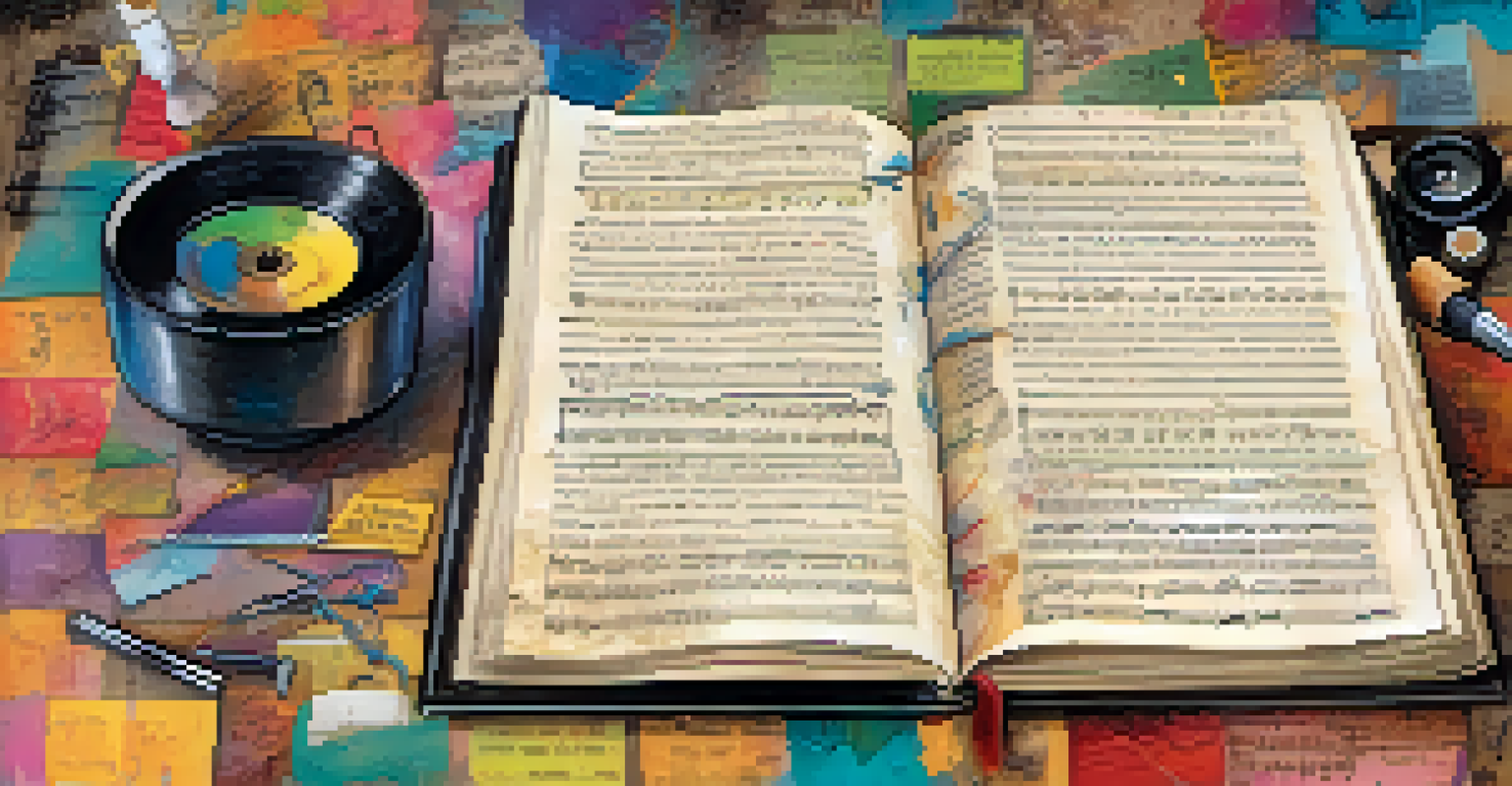Journaling: A Method to Capture Ukulele Song Ideas

Why Journaling is Essential for Songwriters
Journaling is a powerful tool for songwriters, offering a dedicated space to capture thoughts and ideas. It helps you reflect on your feelings and experiences, which can spark inspiration for your next ukulele song. Just like keeping a diary, this method allows you to document your musical journey, making it easier to revisit ideas later.
Journaling is like whispering to one's self and listening at the same time.
By putting pen to paper, you create a tangible record of your creative process. This not only aids in organizing your thoughts but also allows you to track your progress over time. As you look back through your journal, you may find hidden gems that could be the foundation of your next hit song.
Moreover, journaling encourages a habit of writing regularly. When you commit to this practice, you may notice that your creativity flourishes, leading to more song ideas and improved songwriting skills over time.
Setting Up Your Journaling Practice
To get started with journaling, find a notebook that resonates with you—something that feels personal and inviting. This could be a simple lined notebook or a more artistic one with prompts. The goal is to create a space where you feel comfortable expressing yourself freely.

Establish a routine that works for you, whether it's journaling daily, weekly, or whenever inspiration strikes. Consistency is key, as it helps to build a habit that can enhance your creativity. Try dedicating a specific time each day when you can sit down with your ukulele and your journal.
Journaling Fuels Songwriting Inspiration
Keeping a journal allows songwriters to capture thoughts and emotions that can spark new song ideas.
Lastly, don’t stress about perfection. Your journal is a private space for exploration, so allow yourself to write freely without worrying about grammar or structure. The focus should be on capturing the essence of your thoughts and ideas, which can be refined later.
Techniques for Capturing Song Ideas
One effective technique is to jot down snippets of lyrics or phrases that come to mind throughout the day. These short bursts of inspiration can be the seeds for a full song. You might be surprised at how quickly a simple line can blossom into a complete verse or chorus.
The act of writing is the act of discovering what you believe.
Another method is to write about your emotions or experiences in detail. Use your journal as a canvas to explore your feelings, which can lead to meaningful lyrics. For instance, if you had a particularly moving day, describe it in your journal, then try to distill that experience into a song.
Additionally, you can sketch out chord progressions or melodies in your journal. Pairing your written thoughts with musical notes can help you visualize how your ideas come together, making it easier to bring them to life on the ukulele.
Using Prompts to Spark Creativity
Sometimes, staring at a blank page can be daunting. That's where prompts come in handy! Consider using prompts related to themes or emotions that you want to explore in your songs. For example, write about a memorable moment from your past, and then use that as inspiration for your lyrics.
You can also challenge yourself with specific scenarios, such as writing a song from the perspective of a character or an object. This exercise can stretch your creative muscles and produce unexpected ideas that you might not have considered otherwise.
Consistent Practice Enhances Creativity
Establishing a regular journaling routine can lead to improved songwriting skills and an abundance of creative ideas.
Don’t hesitate to mix and match prompts, or even create your own. The key is to keep your journaling sessions fun and engaging, which will ultimately lead to a treasure trove of song ideas waiting to be developed.
Reflecting on Your Ideas: The Importance of Review
After you've filled several pages with your thoughts and ideas, take some time to review what you've written. This reflection can help you identify recurring themes or concepts that resonate with you, guiding your songwriting process. It’s like mining for gold in your own creative output.
During this review phase, don’t be afraid to highlight or circle particularly striking phrases or ideas. This allows you to easily revisit those moments of inspiration later when you sit down to write a song.
Moreover, reflecting on your past entries can give you insights into your growth as a songwriter. You may notice improvements in your style, themes, or even your emotional expression, which can be incredibly motivating.
Collaborating with Others: Sharing Your Journal
While journaling is often a solitary activity, sharing your ideas with fellow musicians can be incredibly rewarding. Consider sharing snippets of your journal entries with trusted friends or collaborators. Their feedback could provide fresh perspectives and inspire new directions for your songs.
You can also engage in journaling sessions with other songwriters. This collaborative approach allows you to bounce ideas off one another while keeping the creative juices flowing. It can be an energizing experience that leads to unexpected musical creations.
Collaboration Enriches Song Development
Sharing journal entries with other musicians can provide fresh perspectives and inspire new directions in songwriting.
Remember, collaboration doesn’t mean sacrificing your voice; rather, it enhances your songwriting journey. By incorporating the input of others, you may find that your songs take on new dimensions you hadn’t previously considered.
Turning Journal Ideas into Complete Songs
Once you have a collection of ideas, it's time to transform them into full-fledged songs. Start by selecting a few entries that resonate most with you. From there, you can begin crafting verses, choruses, and bridges, using your journal as a reference point.
Utilize the melodies or chord progressions you previously explored alongside your lyrics. This combination can help you create a cohesive and engaging song that reflects your unique style and message. Don’t be afraid to experiment as you bring your ideas to life.

Finally, remember to keep refining your song. Just like your journal entries, your song will evolve through multiple drafts and revisions. Embrace the process, and enjoy the journey from a simple idea to a complete piece of music that you can share with the world.